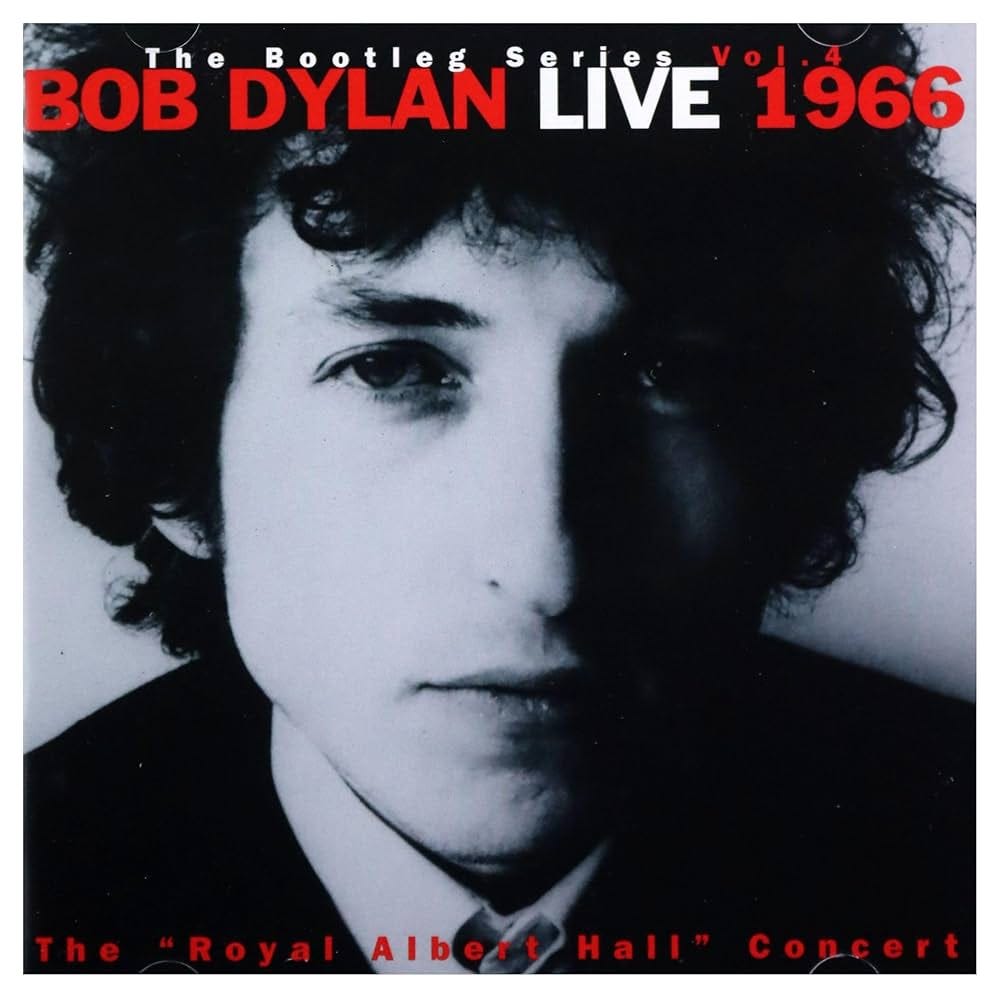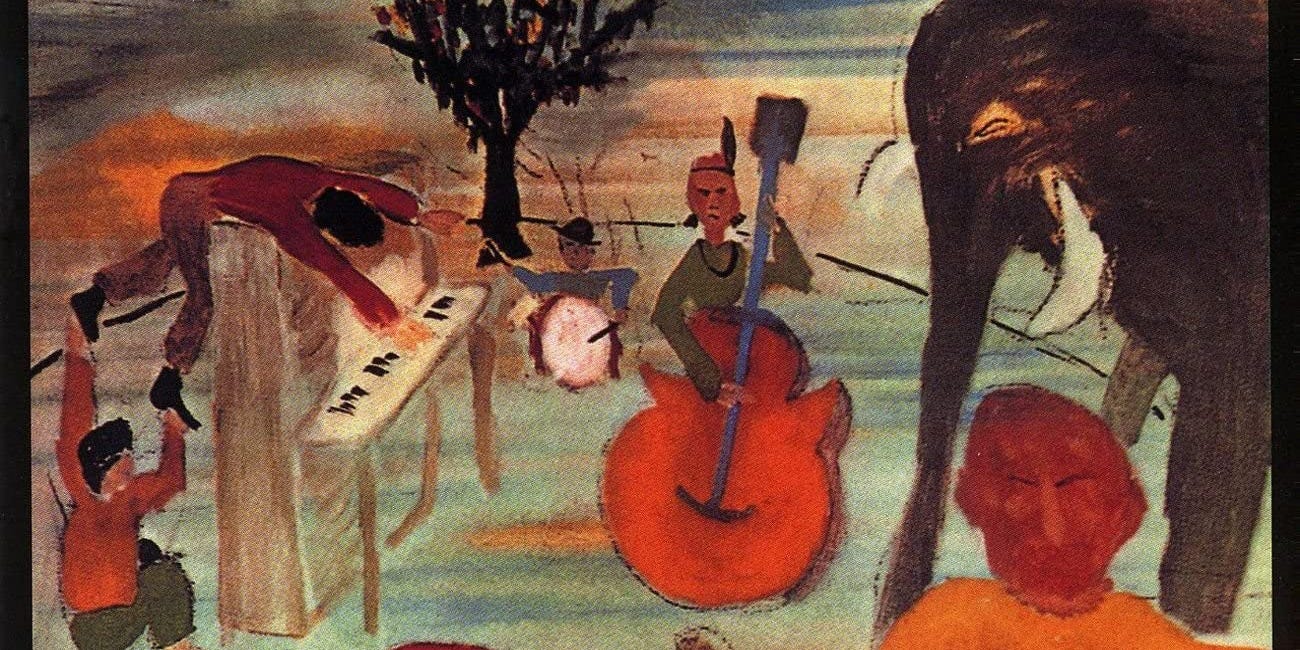Play it f*ckin' loud
Bob Dylan and The Hawks - 'Like A Rolling Stone' (The Bootleg Series Vol. 4: Bob Dylan Live 1966, The "Royal Albert Hall" Concert - 1998)
In my mind, even before appearing on celluloid, Bob Dylan has always been a cinematic figure, whether by design or accident. He’s been the subject of myth-making documentaries (Dont Look Back, No Direction Home), a trickster reimagined by multiple actors (I’m Not There - in which Cate Blanchett steals the show as wild-mercury Dylan), and, in more questionable ventures, an actor in his own self-directed, near-incomprehensible Renaldo and Clara or as ‘Alias’ in Pat Garrett and Billy the Kid. Whether playing himself, being himself or being interpreted by others, Dylan’s on-screen presence has seen almost as much reinvention as the progression of his musical career.
With the eight time Oscar nominee, A Complete Unknown, James Mangold’s biopic starring Timothée Chalamet, Dylan’s story gets its most conventional telling yet, but even here, the man remaining an enigma is part of the plot. The film focuses on the years between 1961 and 1966, charting his rise from Greenwich Village folkie darling to rock’s most divisive figure. Its final and most powerful moment is through repurposing one of the most famous confrontations in rock history, the Judas! incident at Manchester Free Trade Hall, into a dramatic climax where Dylan gives the metaphorical middle figure to those who lifted him up/rode his coattails.1
Mangold instead closes A Complete Unknown with Dylan walking off-stage at the Newport Folk Festival in 1965. As in real life, an audience member bellows “Judas!”, furious that their folk hero has turned rock star. Except, this is for dramatic purposes that serve the plot, the real heckle was in Manchester in 1996. This has divided critics on whether the purity of the heckle coming a year later and on the other side of The Atlantic should have been retained. The irony of there being a divisive reaction around how a divisive reaction is portrayed was at least not lost on me.
Chalamet’s Dylan, wearing his sharp suit and curls into his microphone, responds as history dictates. But Mangold takes some dramatic liberties. The film frames it as a moment of personal defiance, a triumphant statement rather than a weary command after months of graft and jeering. The band launches into ‘Like a Rolling Stone’, but we are denied this as a moment of closure because, as per what happened in 1965 not 1966, Dylan comes back out to do a face-saving folk set. In a sense, this is the right place for the film to end. Dylan was never clearer about what he wanted to leave behind than in this moment. The folk scene, the protest singer label, the expectations of his audience none of it mattered anymore.
The actual concert, recorded at Manchester’s Free Trade Hall on 17 May 1966, was a study in division. The first half was a solo acoustic set, received warmly. But when Dylan returned for the electric second half, backed by The Hawks (soon to be The Band), the mood shifted. The crowd’s hostility had been simmering throughout the tour, but in Manchester, it boiled over. By Ballad of a Thin Man, the audience was audibly restless. As Dylan prepared for the final song, a voice from the darkness rang out “Judas!”
Dylan’s response, immortalised on tape, was a sneering “I don’t believe you… you’re a liar.” Then, turning to his band, he muttered: “Play it f**ing loud.”* What followed was an electrified ‘Like a Rolling Stone’, played at full force, Dylan howling the lyrics like an exorcism. By the final chorus, the boos had subsided into stunned applause.
For decades, the concert was only available through bootlegs. The most famous, The "Royal Albert Hall" Concert, was mislabelled, leading many to believe the recording came from Dylan’s final show of the tour in London. The mix was raw, the sound imperfect, but it was a holy grail for Dylan collectors.
Then, in 1998, Columbia Records finally released the concert officially as The Bootleg Series Vol. 4: Live 1966 – The "Royal Albert Hall" Concert, correcting the misattribution but keeping the famous title. The sound was cleaned up, revealing just how tight The Hawks were, and just how committed Dylan was to tearing the roof off the sucker. If Live 1966 captured anything, it was Dylan at war with his own audience.
Even the heckler’s identity has remained part of Dylan folklore. Over the years, two names have surfaced as the likely critic. John Cordwell, a Manchester-based teacher, and Keith Butler, a student who later claimed he didn’t regret the outburst. Neither man knew at the time that their words would be etched into rock history, debated and dissected for decades.
Dylan’s electric experiment was short-lived, at least on the road. Just two months after the tour ended, he crashed his Triumph motorcycle near Woodstock, New York. The accident, itself shrouded in mystery, forced him into retreat. He wouldn’t tour again until 1974.
In the meantime, The Hawks, now simply The Band, decamped to Woodstock with Dylan, recording what would become The Basement Tapes. By the time they emerged in 1968 with Music from Big Pink, they had transformed into something new: a group with a sound far removed from the bombastic force of Live 1966. If Dylan had been moving forward, The Band had taken a step back, finding inspiration in the past rather than the future.
I see my light come shining
We are building up a head of steam on the posts now, so would be great if you can keep sharing and subscribing
The Judas moment has loomed large in music history, becoming one of the most mythologised confrontations between an artist and their audience. And it remains a reference point even today. In 2022, Cat Power performed a show at London’s Royal Albert Hall, meticulously recreating Dylan’s 1966 Manchester concert in full. I was at this gig and in a complete 180 degree flip the more daring part of the show was tackling the acoustic section. I was initially bowled over by how much her backing band sounded like they were really going for it on ‘Tell Me, Momma’ at the start of the electric portion but they reined in the reedy, Memphis sound just a touch after. Of course, the show was largely populated by 6Music Dads who all wanted to be the one to shout “Judas” but they were outwitted by a gentlemen who gazumped them all by doing it a song too soon.
The recording, Cat Power Sings Dylan: The 1966 Royal Albert Hall Concert, was released in 2023, serving as both a tribute and a reminder of how one of the most controversial performances in rock history has now been embraced as legendary.
And that might be the final irony of it all. What was once seen as betrayal is now canon. The boos have become applause. Dylan, ever the trickster, might well have the last laugh.
Delete as appropriate.




